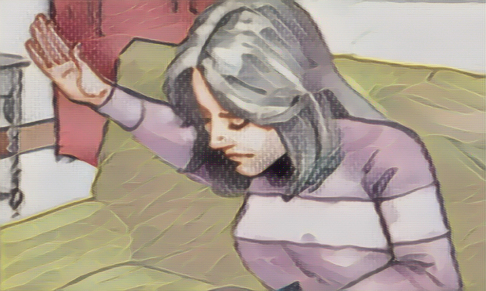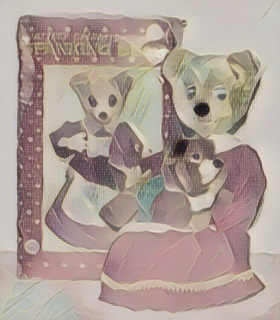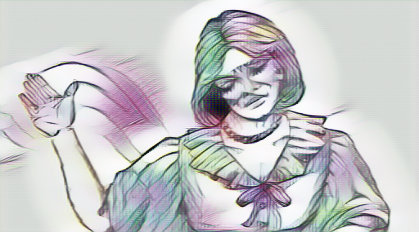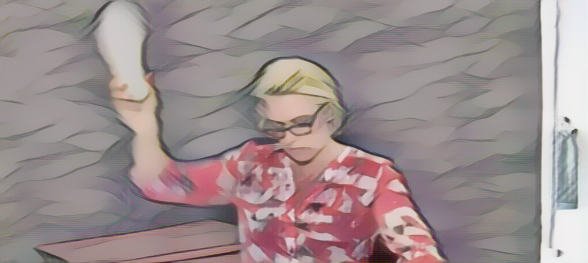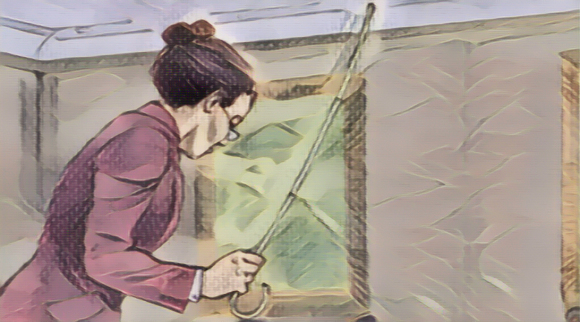(gap: 2s) I have always delighted in the simple joys of reading out of doors, especially when the weather is mild and the sun bathes everything in a golden glow. On one particularly splendid afternoon, I tucked a favourite book beneath my arm and wandered off to a quiet corner of the estate. There, a small pond sparkled, its surface dotted with dainty water-lilies, their white and pink petals opening to the sky. The air was sweet with the scent of honeysuckle, and the gentle hum of bees could be heard as they moved from blossom to blossom. All around, flowering shrubs—azaleas, hydrangeas, and wild roses—formed a living wall, their colours bright against the deep green of the grass.
Nestled on the bank of the pond was a summer house, its wooden frame almost hidden beneath a tangle of ivy and climbing roses. The little house was simple but inviting, with two long, comfortable chairs covered in faded chintz and a small, round table that bore the marks of many happy afternoons spent in conversation or quiet thought. The floor was covered in woven Chinese matting, soft underfoot and faintly fragrant. This was my sanctuary, a place where the world seemed to slow down, and where I could lose myself in stories or simply watch the dragonflies darting over the water.
As I approached, the peaceful scene was suddenly disturbed by the sharp, irregular splash of stones falling into the water. Peering through the leaves, I saw two children—siblings I recognised from the house. The boy, perhaps seven, and his older sister, about ten, were so intent on their mischief that they did not notice me. Their mother, Mrs. Margaret, was a striking woman with a warm manner; she worked in the kitchen, and her children, both with light eyes and curly hair, were known for their high spirits and occasional naughtiness.
The children had no business being at the pond, especially without supervision. I expected them to run away the moment they saw me, but they were completely absorbed in their unkind game, their laughter ringing out in sharp contrast to the tranquil setting.
Drawing closer, I saw what had captured their attention—a small, bedraggled kitten, its fur slicked to its body, struggling desperately in the water. Each time the poor creature managed to paddle to the edge, the children would throw stones, forcing it back into the pond. The kitten’s cries were thin and pitiful, barely audible over the children’s shouts.
My heart filled with anger and sorrow. I have always loved animals, especially cats, and the sight of such helpless suffering made me quite upset. Without thinking, I hurried to the water’s edge, my shoes slipping on the damp grass. I scooped the kitten from the shallows, its tiny body trembling in my hands. I laid it gently on the bank, hoping it would recover, but the damage was done. Its sides heaved once, twice, and then it lay still, its eyes glazed and unseeing. The children’s laughter faded, replaced by a heavy silence.
A wave of indignation swept over me. I turned to the children, who now stood quite still, their faces pale and eyes wide. It seemed the seriousness of what they had done had only just dawned on them. I took each by the hand—my grip firm and steady—and led them into the summer house. My mind was set on teaching them a lesson they would not soon forget.
As their elder and caretaker in that moment, I felt a great responsibility. Their actions required consequences, and I resolved to deliver a punishment that would impress upon them the seriousness of their behaviour. The girl, in particular, seemed to have led the way, her brother following her with the trust of the very young.
I scolded them as sternly as I could, my words coming quickly. I spoke of kindness, of the pain they had caused, and of the trust that animals place in us. Their faces remained impassive, but I saw a flicker of shame in the girl’s eyes. I ended my lecture with a grave announcement: a spanking was in order. They did not flinch, only watched me with a strange, almost detached curiosity, as if they were waiting to see what would happen next. I recalled stories of their previous mischief—how the girl had been punished by Dinah for stealing, how the boy was no stranger to discipline.
I sat down heavily in one of the cushioned chairs, the old wood creaking beneath me. I slipped off my slippers—sturdy things, the soles thick and slightly worn, quite suitable for the task ahead. I pointed to the boy, who came forward, his shoulders slumped in resignation.
Memories of my own childhood came to mind—my father’s stern face, the ritual of discipline, the strange mixture of fear and relief that followed. I lifted the boy across my knees, his small body tense and trembling. He looked back at me, his eyes searching my face for mercy or perhaps for understanding.
I raised the slipper, feeling the weight of the moment, and brought it down with a sharp, echoing smack. The sound rang out, startling a pair of birds from the nearby shrubs. The boy yelped, a high, startled cry, and I delivered another smack, then another, each one measured but firm. His legs kicked, his arms flailed, and soon he was sobbing, his face buried in the cushion, his cries mingling with the distant song of a lark.
I held him steady, determined not to let my own emotions interfere. By the time I finished, his bottom was quite red, and he knelt on the matting, hiccuping and rubbing his eyes, his pride as bruised as his skin.
The girl watched in silence, her face unreadable. When I called her, she came forward with a quiet dignity, her chin lifted, her eyes dry. I settled her across my knees, telling myself that this punishment was necessary, that she needed to understand the gravity of her actions.
The first smack landed with a satisfying thwack, but she made no sound. I continued, each blow a punctuation mark in my silent lecture. At last, her composure broke—she gasped, then burst into tears, her hands flying back to shield herself. I caught her wrists, holding them gently but firmly, and finished the task, the summer house echoing with her cries.
The rhythm of the slipper, the sharp, staccato slaps, seemed to fill the space, mingling with the scent of roses and the distant murmur of the pond. I remembered my father’s method—firm, unwavering, but never cruel. I steeled myself, determined to see it through, even as her pleas tugged at my heart.
I felt no pity, not after what she had done. The image of the kitten, limp and lifeless, hardened my resolve. I ignored her sobs, her promises to be good, and delivered the final strokes, certain that she would remember this day for years to come.
At last, I slipped my slipper back on, my hands shaking slightly. I leaned back, exhausted, my breath coming in short bursts. The children stood before me, their faces streaked with tears, their bodies trembling. For a moment, none of us spoke. The only sound was the gentle rustle of leaves outside and the distant croak of a frog.
I told them they could go, my voice softer now. They shuffled out, casting one last, mournful glance at me before disappearing into the garden, their steps slow and heavy.
Alone again, I felt a strange mixture of satisfaction and sadness. Justice had been served, but the innocence of the afternoon was gone. I propped my feet on the chair, opened my book, and tried to lose myself in its pages. The scent of flowers drifted in on the breeze, mingling with the memory of what had passed—a lesson learned, a wrong avenged, and the quiet hope that, in time, kindness would take root where unkindness once grew.

